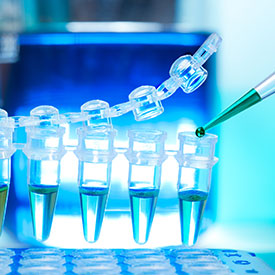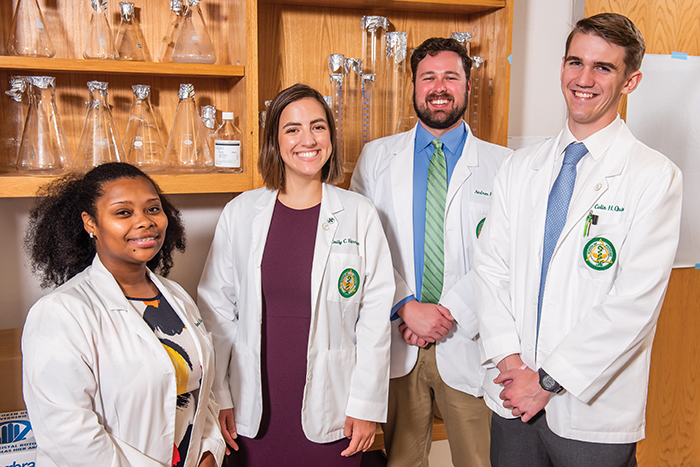 The summer after a student’s first year of medical school is often dubbed the “last summer.” Some medical students spend their “last summer” traveling, saving money, or relaxing at home. Other students take the opportunity to gain valuable research experience, getting a head start on a required part of the medical school curriculum.
The summer after a student’s first year of medical school is often dubbed the “last summer.” Some medical students spend their “last summer” traveling, saving money, or relaxing at home. Other students take the opportunity to gain valuable research experience, getting a head start on a required part of the medical school curriculum.
“As a medical school that requires every graduating student to formally participate in research or scholarly activity, we think it’s important to offer that opportunity as early as possible,” says Craig Hoesley, M.D., senior associate dean for medical education and professor in the Division of Infectious Diseases. “We are fortunate to have such a diverse and broad research enterprise here on our campus, which provides significant opportunities for our students to engage in scholarly projects at a high level.”
Amaris Elston
Family health problems led Amaris Elston, MS2, to medicine. When graduating from UAB with a degree in psychology, Elston says she hadn’t decided what she wanted to do. Her brother, Donovan, was diagnosed with toxic shock syndrome when she was 8 years old, an experience that introduced her to the medical world. Right before she graduated, her brother faced complications during surgery. “The doctor came out and told us he was unresponsive and unable to move his left side,” Elston says. “That experience showed me practicing medicine was where I was supposed to be.”
Elston encountered the world of kidney transplantation thanks to a perfect match. She was completing a master’s program before applying to medical school when her sister Dominique was diagnosed with end-stage renal disease. In December 2018, Elston donated her kidney to her sister. “During the process, it dawned on me that kidney transplants don’t occur as often as they should in order to save as many lives as possible,” Elston says.
After her experience with transplants, Elston spent her summer doing research with Jayme Locke, M.D., MPH, director of UAB’s Incompatible Kidney Transplant Program and the Comprehensive Transplant Institute, among other roles. The research focuses on the Living Donor Navigator Program, UAB’s program for kidney donor matching. “The program has increased the number of African-American kidney donations by a much greater number than in other ethnic groups,” Elston says.
She works with donors and recipients who have gone through the program, assessing what aspects worked for them. “If we can figure out why it has worked so well among African-Americans, we can use that information to implement programs like it across the country.”
Elston notes she is drawn to medical research because it connects all the dots. “When you’re a physician, you’re helping people. When you’re an academic medical professional, you’re helping people even outside of the clinic,” Elston says. “I think that’s the value of working in academic medicine.”
 Left to right: medical students Amaris Elston, Emily Harrison, Andres Camino, and Colin Quinn. Colin Quinn
Left to right: medical students Amaris Elston, Emily Harrison, Andres Camino, and Colin Quinn. Colin Quinn
A series of childhood events piqued Massachusetts native Colin Quinn’s interest in medicine. “When I was in sixth grade, I lost one of my good friends to pediatric cancer,” Quinn, MS2, says. “That same month, my mom was diagnosed with cancer, so that year exposed me to the medical world.” Quinn attended The Ohio State University for undergrad and became involved with BuckeyeThon, Ohio State’s Miracle Network Dance Marathon, where he developed a passion for pediatric cancer.
He carried that passion to UAB, spending his first summer in medical school conducting pediatric cancer research in the lab of Elizabeth Beierle, M.D., the Charles D. McCrary Endowed Chair in Pediatric Surgery. “We specifically look at solid pediatric tumors,” Quinn says. “A lot of research and progress has been made in blood cancers, but we’re trying to see that same progress in cancers like neuroblastoma, hepatoblastoma, and kidney tumors.”
Underfunded compared to other cancer types, pediatric cancer must be approached differently than adult cancers due to differences in the cancer profiles. “You can’t treat a kid born with a cancer mutation the same way you would treat an adult with lung cancer who has been smoking for 30 years,” Quinn says. The lab examines the tumors to see what kinds of mutations they have, and then looks at how the mutations respond to different drugs.
“I’ve always wanted to be doing something that feels like it has a purpose,” Quinn says. “It can feel like you’re not doing anything purposeful when just sitting in a classroom all day. I think that’s why I wanted to get involved in research.”
Emily Harrison
Birmingham native Emily Harrison, MS2, returned to her hometown for medical school after earning her chemistry degree at Rhodes College. After her first year at UAB, she was unsure how she wanted to spend her “last summer.”
After struggling to find a lab she wanted to work in, Harrison found a perfect fit with Marissa Gowey, Ph.D., assistant professor in the Division of Pediatric Gastroenterology, Hepatology and Nutrition. “In this lab, we focus on the executive function—which is a specific type of cognitive function used for self-regulation—and how it relates to different health habits and risk factors in children,” Harrison says. She helped enroll children in the program and assessed them after they enrolled. “At assessments, we collect their blood data, get body scans, and assess cognitive and executive functioning. We are looking for a relationship among body composition, biomarkers such as blood sugar levels and insulin, and self-regulation. The study’s long-term goal is to see if there’s a relationship between those three things, and we want to use those findings to help create better interventions for children with obesity.”
Andres Camino
Andres Camino, MS2, found his way to the School of Medicine after studying classical civilization at Duke University. “My dad is a doctor, so pursuing a career in medicine was always in the back of my mind,” Camino says. “But I wanted to go into college being open to other things. I didn’t want to be confined to medicine just because that’s what I was familiar with.” With minors in biology and chemistry along with his classical civilization degree, Camino pursued his master’s degree in biomedical science before applying to medical school.
“I was kind of scared of research in undergrad, so I don’t have a ton of experience with it,” Camino says. “I’m glad that UAB has the opportunity to do this research and helps provide us with funding.” Camino is doing research in the UAB Sexual Health Clinic with Nicholas Van Wagoner, M.D., Ph.D., associate dean for students.
“The clinic opened in 2015, and there hasn’t been a study that looks at how students utilize it or assesses its outreach,” Camino says. He looked into the clinic’s positive screening rates for sexually transmitted infections on campus and organized focus groups this fall to see what students think of the clinic.
“I enjoy that research and medicine in general have a public health epidemiological side, and I think infectious disease is a great specialty that has a significant public health impact,” Camino says. “Doing clinical research and interacting with your patients is great, but affecting a greater population through your work is something that I really like.”
By Bennett Page